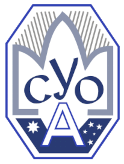The Australian Ukrainian community traces its foundation to the arrival of post-World War 2 refugees from war torn Europe. These refugees were termed Displaced Persons and began arriving in 1948. Prior to 1948 only a small number had arrived, and most of these were not nationally aware individuals. The most notable of these was Nicolai Miklouho-Maclay, an ethnographer and naturalist who visited Australia in 1878, and was responsible for the building of Australia’s first biological field station at Watson’s Bay in NSW.
Today, there is a vibrant albeit small Ukrainian community of between 30,000 and 50,000 people, predominantly living in Melbourne and Sydney. There are also large Ukrainian centres in Geelong, Brisbane, Perth, Adelaide and Canberra. Smaller centres exist in Queanbeyan, Hobart, Newcastle, Moe, Albury-Wodonga, and Northam.
The 1950’s saw a huge birth of community organisations, churches and centres. They brought with them what they treasured most: – their Christian faith, their traditions and their seven-thousand-year-old culture. Gradually over the years of settlement, Ukrainians through their own hard work and dedication, built a network of churches, community centres, financial institutions and language schools throughout Australia, and fund Ukrainian studies at Monash and Macquarie universities. The Ukrainian schools provide opportunities for students to learn the language, history, literature and culture of the Ukrainian people. The community centre provides a meeting place for various youth, women’s and senior citizens’ social activities, recreation, concerts and so forth. The dance ensemble regularly represent Ukrainians at many festivals and the choir performs a variety of songs at concerts.
Informing the general Australian community and political circles about the lack of human and political rights in Ukraine was a major concern of the community until Ukraine gained its independence on 24 August 1991. The sixties through to the late eighties saw a large number of political manifestations throughout all the major capital cities of Australia, particularly after Soviet Ukraine increased national repression in the late sixties.
In 1975 Australia abandoned its White Australia Policy in favour of a policy of Multiculturalism which saw the rise of Ukrainian language radio programming around the country, as well as funding opportunities for artistic groups, for language classes.
In the late eighties, as the independence movement strengthens in Ukraine through the policies of Glasnost and Perestroika throughout the USSR, Ukrainian politicians begin to visit Australia. The local community abandons its practice of not encouraging official contact with Ukraine and begins to actively seek new ways to cooperate with officials from Ukraine. An honorary consulate is established in Melbourne. Community delegates begin to visit Ukraine. There begins a cultural exchange where artistic groups from both countries begin to tour both Ukraine and Australia.
The incorporation of recently arrived Ukrainians into existing community structures is of high priority to the community.
Australia’s Ukrainian community is actively engaged in dialogue activities with other faiths and communities. Australian Ukrainians are actively engaged in the process of developing a multicultural society which recognises religious, as well as ethnic, diversity.
While Australia is basically a tolerant and non-discriminatory society, the AFUO occasionally deals with issues of an anti-Ukrainian or Ukrainiaphobic nature. Small groups occasionally target the media with articles which slander the entire community, usually to do with activities during WW2. Ukrainians have lost 7,000,000 people during an artificial famine in 1932-33, in excess of that number during the Second World War, and are extremely aware of acts of genocide against a particular people. The Ukrainian community sees anti-Ukrainian behaviour as damaging to the fabric of Australian society, and is firmly opposed at all levels.
